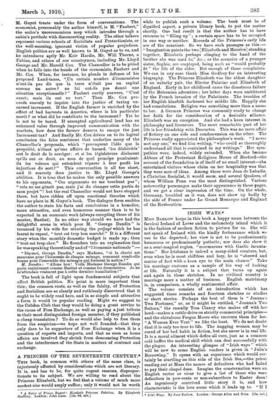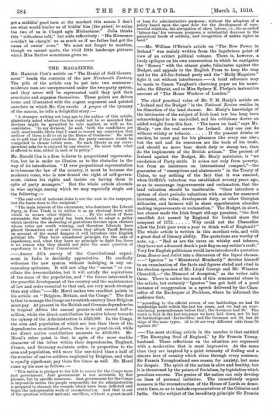IRISH WAYS.*
Miss BARLOW keeps in this book a happy mean between the farcical Ireland of Lever and the melancholy island which it is the fashion of modern fiction to picture for us. She will not speak of Ireland with the kindly forbearance which we use to the departed; her view is not to be predominantly humorous or predominantly pathetic; nor does she show it as a semi-magical region, "murmurous with Gaelic incanta- tions." Her Irishman is indeed a many-sided creature, but, even when he is most shiftless and lazy, he is "shrewd and matter of fact with a keen eye to the main chance." Take his marriage customs as a sample of his way of looking at life. Naturally it is a subject that turns up again and again in these sketches. In no civilised country is marriage more a matter of business. English matrimony is, in comparison, a wholly sentimental affair.
The volume consists of an introduction which has suggested these remarks and fourteen sketches or studies or short stories. Perhaps the best of them is " Joanna's Two Fortunes," or, as it might be entitled, "Joanna's Two Suitors," the rascally Tom Clancy who makes off with her herd—makes a cattle-drive on strictly commercial principles— and the chivalrous Fergus Moore who recovers them for her. "A Woman Ever Vest" we like the least. We do not doubt that it is only too true to life. The nagging woman may be cured of her bad habit in fiction, but she never is in real life. It is a moral ailment which defies all cure, just as a common cold baffles the medical skill which can deal successfully with the plague. An. interesting glimpse of "Irish ways " which will be new to some English readers is given in " Julia's Borrowing." It opens with an experience which would cer- tainly be startling on this side of the Irish Sea,—the priest reading out at Mass the names of defaulters who had failed to pay their chapel dues. Imagine the consternation were an English rector or vicar to give a list of those who were defaulters in pew-rents or non-subscribers to Easter dues ! An ingeniously contrived little story it is, and how characteristic is the love scene which it leads up to. "If I
• Irish Ways. By Jane Barlow. London: George Allen and Bons. Me. net.]
get a middlin' good turn at the mackerl this saison I don't see what would hinder us of biddin' him [the priest] be axing the two of us in Chapel agin Michaelmas." Julia thinks this " ridiculous talk," but adds reflectively : " His Riverence couldn't be chargin' us as much as if me father had got the name of ownin' cows." We must not forget to mention, though we cannot quote, the vivid little landscape pictures which Miss Barlow sometimes gives us.















































 Previous page
Previous page